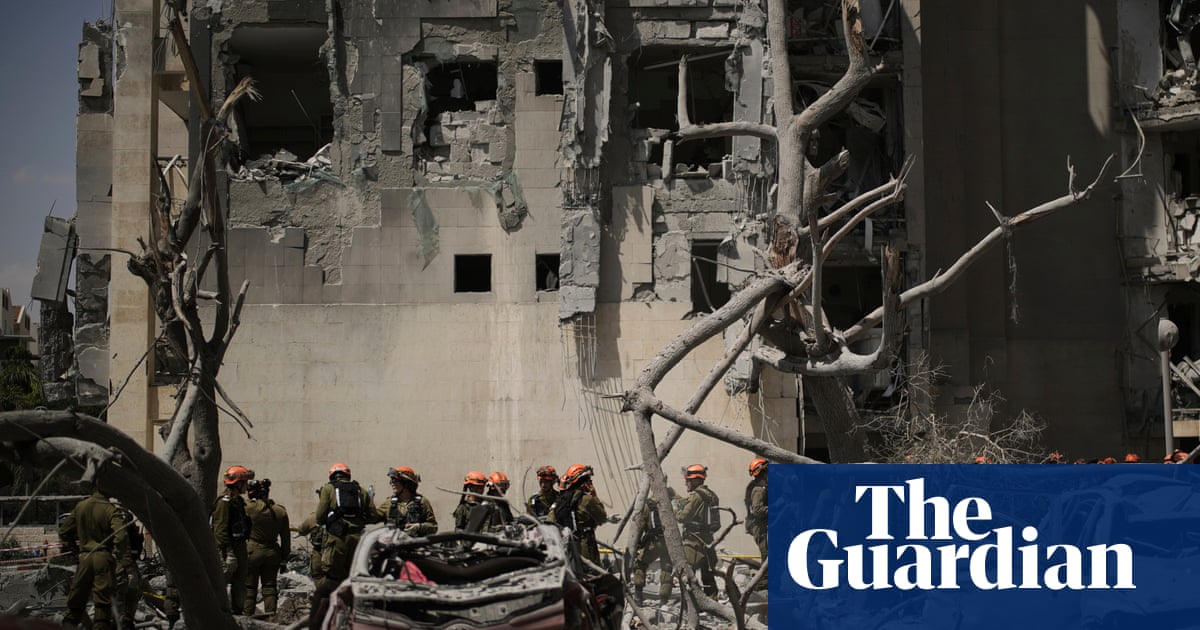Good morning.
Donald Trumphas declared a ceasefire intended to bring an end to a 12-day war between Israel and Iran – but despite public acceptance of the truce,both sides continued to exchange fire this morning.
Air raid sirens sounded in northern Israel at about 10.30pm in response to what the Israeli military said was an Iranian missile launch, two and a half hours after the ceasefire was first announced. Israeli reports said that two missiles had been intercepted. Iran denied launching missiles after the ceasefire but Israel’s defense minister, Israel Katz, said he had ordered immediate retaliation on Tehran.
“I have instructed the IDF to respond forcefully to Iran’s violation of the ceasefire with powerful strikes against regime targets in the heart of Tehran,” Katz said in a statement.
What did Trump say about the ceasefire?Just after 5am GMT,Trump posted to social media that a ceasefire was now in effect, adding: “PLEASE DO NOT VIOLATE IT!” Earlier he told NBC the ceasefire was “unlimited” and would last “forever”.
This is a developing story.Follow our updateshere.
The US supreme court yesterday paved the way for the Trump administration to resumedeporting immigrants to countries they are not from, including to conflict-ridden places such as South Sudan.
In a brief, unsigned order, the court’s conservative supermajority paused the ruling by a Boston-based federal judge who said immigrants deserved a “meaningful opportunity” to bring claims that they would face the risk of torture, persecution or even death if removed to certain countries that have agreed to take people deported from the US.
As a result of yesterday’s ruling, the administration will now be allowed to swiftly deport immigrants to so-called “third countries”, including a group of men held at a US military base in Djibouti whom the administration tried to send to South Sudan.
What did the court say?The court offered no explanation for its decision and ordered the judge’s ruling paused while the appeals process plays out. The three liberal justices issued a scathing dissent.
How did the White House react?A White House spokesperson, Abigail Jackson, said: “The supreme court’s stay of a leftwing district judge’s injunction reaffirms the president’s authority to remove criminal illegal aliens from our country and Make America Safe Again.”
New Yorkers are headed to the polls today in a primary election that is bothlikely to decide the city’s next mayorand have major political implications for the future of the Democratic party.
The race pits two drastically different Democrats against one another. Zohran Mamdani, a 33-year-old Democratic Socialist endorsed by the progressive wing of the Democratic party, is the main challenger to Andrew Cuomo, the former New York governor who has been backed by the party’s centrists and billionaire donors.
Cuomo, who resigned as governor in 2021 after more than a dozen women accused him of sexual harassment, was the clear frontrunner earlier in the year. But Mamdani has enjoyed a meteoric surge in polls in recent weeks and could benefit from the primary’s ranked-choice voting system.
What does Mamdani stand for?Mamdani has run on a progressive platform, promising to freeze rent and make buses free citywide. His campaign has been propelled by a social media following that dwarfs his rivals’. He was endorsed by the Bronx congresswoman Alexandria Ocasio-Cortez and has also won the backing of Bernie Sanders.
Volodymyr Zelenskyy said he believedPutincould try to attack a Nato member within the next five years.The Ukrainian president was speaking to Sky News beforethe Nato summit, which begins today.
A federal judge yesterdayblockedTrump’s administrationfrom implementing his plan to bar foreign nationals from entering the United States to study at Harvard University. The White House had cited “national security concerns” for the plan.
U2’s guitarist The Edge hasofficially become Irish62 years after moving from the UK to Ireland as a baby.The 63-year-old British subject was conferred with Irish citizenship yesterday in a step he said was “long overdue”.
The National Weather Service (NWS) has issued several extreme heat warnings and advisories as adangerous and prolonged wave of high temperatures and humidityblankets much of the central and eastern US, with the worst conditions expected to persist into the middle of this week.
Until now mostly untrammelled by development, Sazan, a small island off the coast of Albania, ison the verge of becoming a mecca for ultra-luxury tourismas another addition to Ivanka Trump and Jared Kushner’s real-estate portfolio. Albanians call SazanIshulli i Trumpëve– Trump Island. But before development can begin there, the unexploded ordnance – explosive weapons – needs to be removed.
In 1971, a man held a plane to ransom for $200,000, then parachuted out in his suit and dress shoes, never to be seen again. Leaving aside the audacity of the stunt,several questions persist: who was Cooper? A former paratrooper or a chancer? Where was he from? Was he never found because he didn’t survive the jump?
First Thing is delivered to thousands of inboxes every weekday. If you’re not already signed up,subscribe now.
If you have any questions or comments about any of our newsletters please emailnewsletters@theguardian.com
